In 2014, I read 20 fiction & non-fiction books. Here’s the tail-end of the list, ranked in order of my own most subjective preference. Not necessarily in order of literary greatness, but in terms of my enjoyment of the book, whether it dazzled me with language, or made me think new thoughts, or made me want to make things, or stayed with me long after I read it, or made me feel something, or all of the above. (This also includes an addendum on poetry and the books I abandoned.)
16. Like Life (1990) – Lorrie Moore (Vintage)
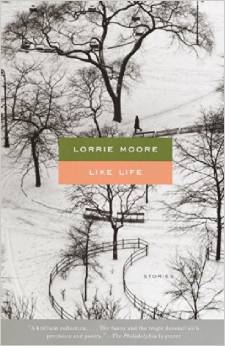
Lorrie Moore is usually categorized as a funny writer, and she is. But she is consistently devastating, too. Nobody talks about that. I had read this book in 2007 and it depressed the hell out of me then. This time I couldn’t get through some of the stories, she takes the pain so far. “The Jewish Hunter” is my favorite, maybe because some genuine human connection actually takes place (although it’s not lasting).
17. Laughable Loves (1969, 1974 in English) – Milan Kundera (Harper Perennial)
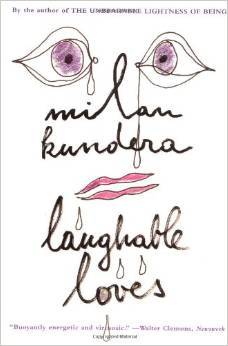
It’s not worth getting offended over Kundera’s attitudes towards women as his books are almost quaint time capsules of a certain attitude, at this point. In that spirit, I enjoyed these stories, pretending I was a roué Czech doctor for a little while. He’s also deft in depicting the ways a corrupt Communist state infiltrates all parts of life.
18. In Defense of Food: An Eater’s Manifesto (2008) – Michael Pollan (Penguin Books. Bought at Human Relations bookstore in Bushwick)
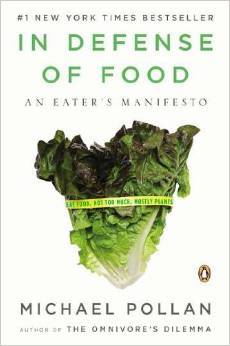
I think this could have worked as a long essay, especially if you’ve read the revelatory Omnivore’s Dilemma. I read this early in the year and can’t remember too much about it, actually, but maybe this is because so much of Pollan’s thinking has permeated our language around food choices and politics (“Eat food, mostly plants,” etc.).
19. Animal, Vegetable, Miracle (2007) – Barbara Kingsolver (Harper Perennial. Received as a gift, sold it to a used bookstore)
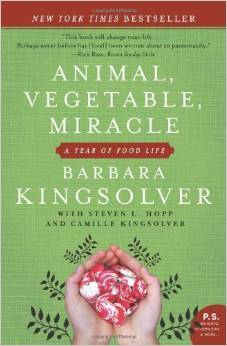
A non-fiction account of how Kingsolver and her family moved to a farm in Virginia to live the true locavore lifestyle, growing or raising all of their own food, or procuring it from a 100-mile (I think?) radius. It gave me a new appreciation for the knowledge and work small-farm farmers do. The book is at its best when she gets deep into the details of farm life, for example, about the mating lives of turkeys. I was less interested when she wrote as an advocate and called on the reader to take similar actions (for example, get a second freezer in order to eat local throughout the winter), particularly as I am already fairly educated about the environmental and political issues surrounding food production and distribution, and am doing the best I can. At those times it came off as preachy or defensive. Also, I just can’t take on feeling guilty for eating bananas at this point at my life.
20. The Sense of an Ending (2011) – Julian Barnes (Vintage)
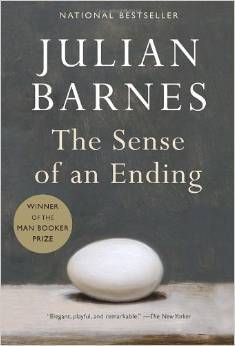
I love Julian Barnes (especially Flaubert’s Parrot), but I didn’t like the narrator in this story, who kept insisting on his ordinariness, a conceit that seems played out. I think it was a device here, Barnes emphasized the protagonist’s cluelessness in order to keep twisting the plot, in a clever way. Ultimately, it felt to me like the book was about its own cleverness and didn’t convince me on an emotional level.
BOOKS ABANDONED
I Love Dick – Chris Kraus (1997)
I was really ready to love this book, I was excited when I bought it. I liked everything about it in theory – the loose form, the fact that it deals with issues of sexuality, gender, open relationships, feminism from a personal perspective – but I don’t know what happened. It didn’t hold my interest. Maybe because Kraus is so obsessively internal, letters about letters. I got claustrophobic. I even tried twice with it.
Z a novel of Zelda Fitzgerald (2014) by Therese Anne Fowler
I couldn’t get past page 3. Not at all how I would imagine Zelda Fitzgerald’s voice. This is like the Hollywood version, or the version made for a docile book club.
Et après… par Guillaume Musso
Picked this up in an attempt to keep up my French. And actually, it made me feel good about my French because I could tell it was badly written! (Schlocky, clichéd.) Also, it takes place in New York! If I’m going to read a book in French I don’t want to be back in NYC
